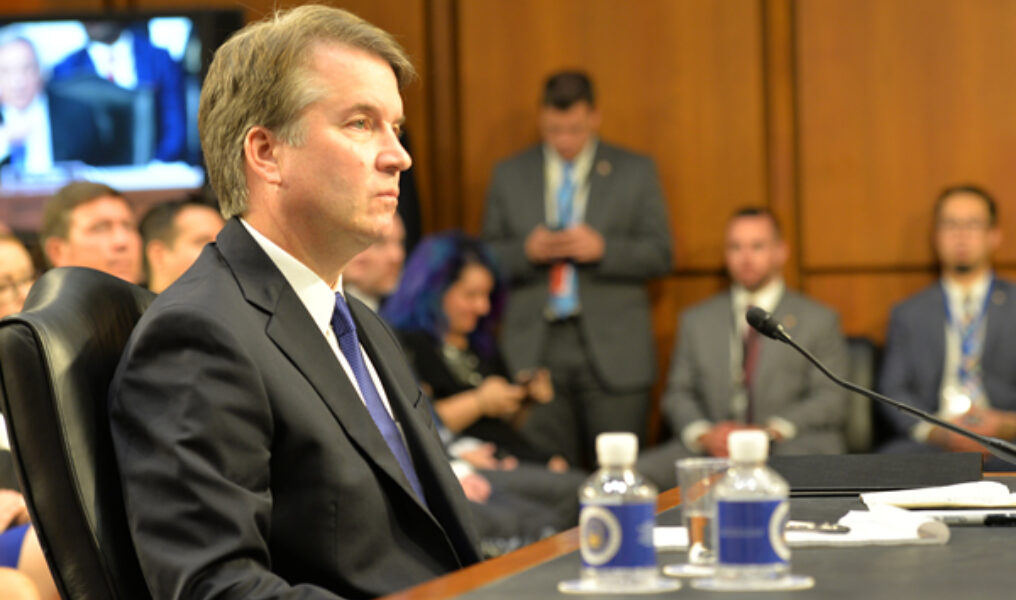President Trump's nominee to the U.S. Supreme Court Brett Kavanaugh shifted to the ruling in the Masterpiece Cakeshop case — which came down in favor of a Colorado baker who refused to make a custom-made wedding cake for a same-sex couple — when asked Thursday whether he supports the historic ruling for same-sex marriage nationwide.
Under questioning from Sen. Kamala Harris (D-Calif.), Kavanaugh refused to say whether he thinks the Supreme Court's 2015 decision in Obergefell v. Hodges was correctly decided.
Kavanaugh cited a practice of nominees to refuse to comment on personal views or precedent set by the high court. That's consistent with his responses to questions on other decisions, including Roe v. Wade.
Instead, Kavanaugh referenced five cases on LGBT rights written by former Associate Justice Anthony Kennedy, whose seat he'd occupy on the high court, counting among them the Masterpiece Cakeshop decision narrowly in favor of Jack Phillips.
As Kavanaugh proceeded to enumerate the rulings, Harris interrupted and said "if we could just talk about Obergefell, that would be great," redirecting the nominee to address Obergefell. But Kavanaugh noted each of the decisions, the 1996 ruling in Romer v. Evans, the 2003 ruling in Lawrence v. Texas, the 2013 decision in Windsor v. United States, the 2015 decision in Obergefell v. Hodges, and the 2017 decision in Masterpiece Cakeshop v. Colorado Civil Rights Commission.
Kavanaugh said he wanted to read a statement from Masterpiece Cakeshop, but Harris insisted he address the Obergefell decision, calling it a "yes or no" question. Nonetheless, Kavanaugh pressed forward with the statement from the Masterpiece Cakeshop decision.
"In Masterpiece Cakeshop, and this is, I think, relevant to your question, Justice Kennedy wrote in the majority opinion joined by Chief Justice [John] Roberts and Justice [Samuel] Alito and Justice [Neil] Gorsuch and Justice [Stephen] Breyer, the days of discriminating against gay and lesbian Americans as inferior in dignity and worth are over," Kavanaugh said.
Asked by Harris if he agrees with that statement, Kavanaugh replied, "That is the precedent of the Supreme Court."
When Harris followed up by asking Kavanaugh again if he agrees with Obergefell, Kavanaugh dodged.
"Each of the justices have declined as a matter of judicial independence, each of them, to answer in that line of questions," Kavanaugh said.
Harris pointed out Kavanaugh once said the ruling in Brown v. Board was one of the greatest moments in the court's history and asked the nominee whether he thinks the same about Obergefell, but the nominee refused to say.
"I've said, senator, consistent with what the nominees have done, that the vast swath of modern case law, as Justice Kagan, you can't as a nominee in this seat, give a thumbs up or thumbs down," Kavanaugh said.
Pressed again by Harris on whether Obergefell was a great moment, Kavanaugh again referred to Masterpiece.
"Justice Kennedy wrote the majority opinion saying the days of treating gay and lesbian Americans, or gay and lesbian couples, as second-class citizens or inferior in dignity or worth are over in the Supreme Court," Kavanaugh said. "That's a very important statement."
Chad Griffin, president of the Human Rights Campaign, criticized Kavanaugh in a statement for refusing to support the Obergefell decision.
"Brett Kavanaugh's refusal to answer very basic, very direct questions about the Supreme Court's historic ruling bringing marriage equality nationwide is alarming and completely unacceptable," Griffin said. "The Obergefell decision is settled law. If this nominee cannot so much as affirm that or the fundamental equality of LGBTQ people and our families, he should not and must not be granted a lifetime appointment to our nation's highest court."
Gregory Angelo, president of Log Cabin Republicans, on the other hand said Kavanaugh's response was worthy of praise.
"A Supreme Court nominee who declares that 'the days of discrimination against gay and lesbian Americans are over' is someone every LGBT American should celebrate — without exception," Angelo said. "Even Ruth Bader Ginsburg refused to make such an assertion during her hearings, and she was confirmed by a vote of 96 to 3."
This article originally appeared in the Washington Blade and is made available in partnership with the National LGBT Media Association.










